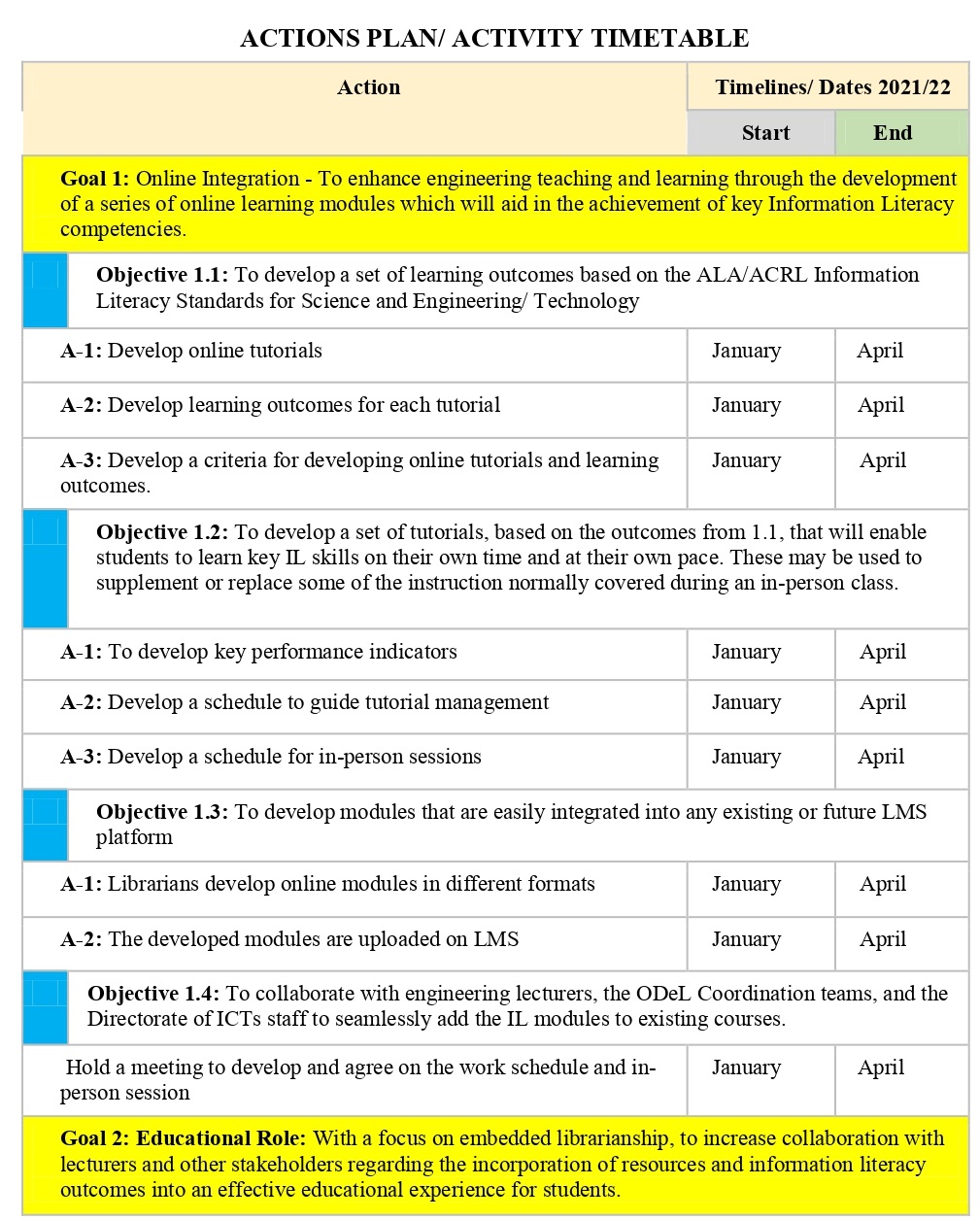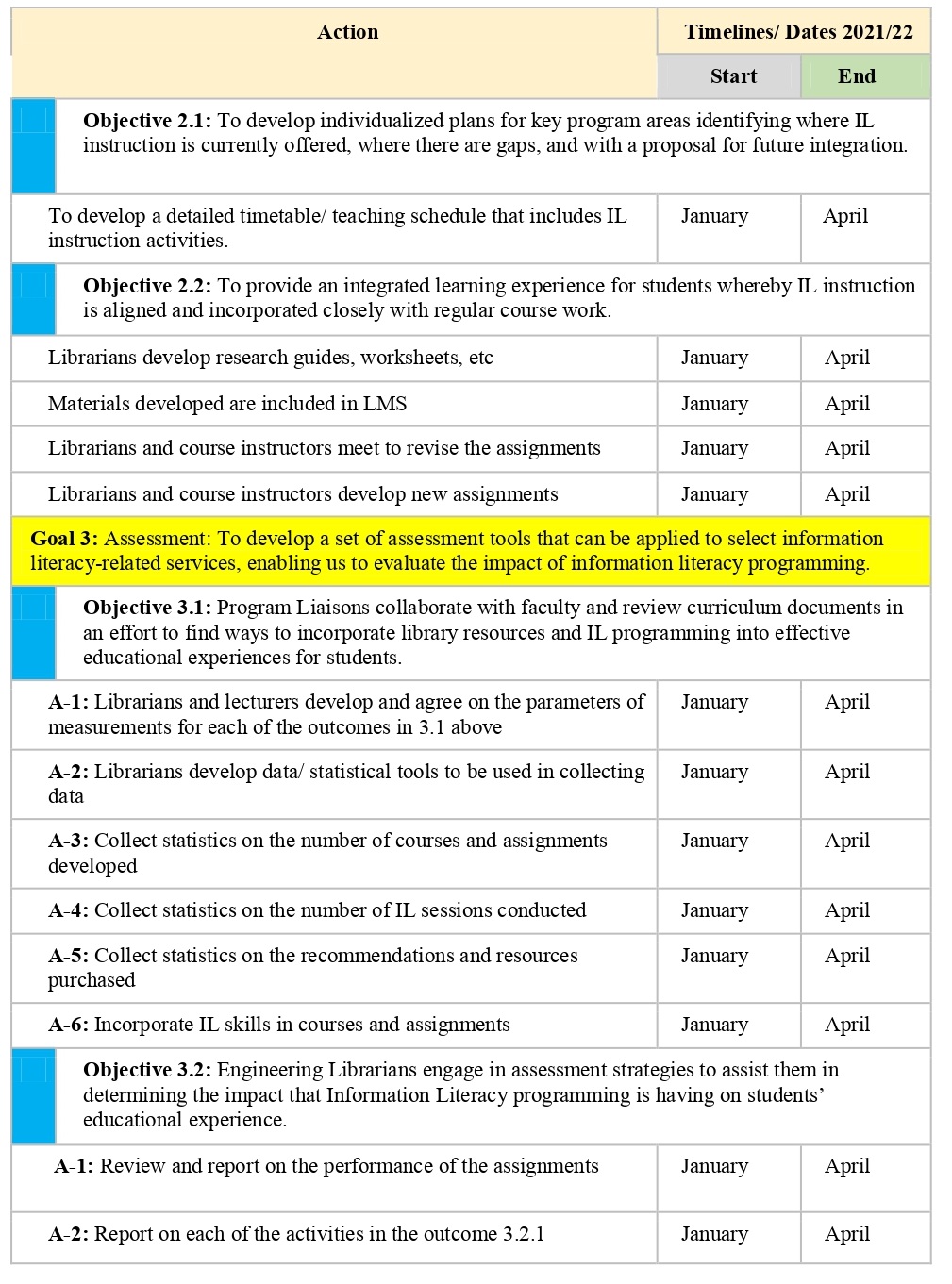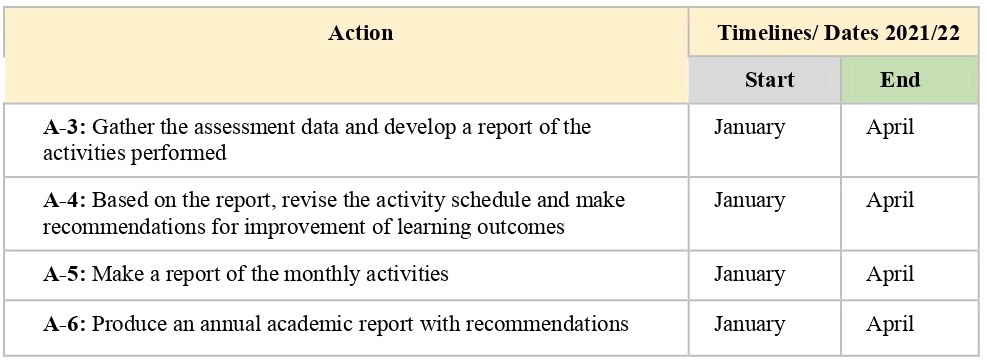 |
ENGINEERING INFORMATION FOUNDATION Signifying Excellence @ Busitema University Library THE LIBRARY |
 |
![]()
Inception Report
A guide for curriculum reviews is contained in the inception report. It delivers a synopsis of the curriculum review procedure and offers a set of guidelines for developing the curriculum. This process resulted in a new curriculum, or disciplinary-based information literacy E-curriculum, that Busitema University uses to teach Engineering courses. The philosophy, objectives, goals, learning experiences, materials for instruction, and assessments will all be described in the new curriculum. As a result, this guide outlines the procedures for creating a new curriculum that articulates the knowledge and skills that Engineering students should possess and additionally the kind of assistance that lecturers require to meet project objectives. As a consequence, the inception report functions as a model curriculum review guide, which will aid in creating and placing into practice an excellent curriculum for instruction. The report provides project implementation timelines and activity descriptions; the first workshop will be used to further discuss the broad timelines with members of the Curriculum Review Committee. The report goes on to address the important concerns that could have an impact on how the project is implemented and offers likely remedies.
The inception report is organized into sections numbered A to K.
- Section A introduces the inception report with a brief summary specifically on the Sections
- Section B provides a brief project background, overall goal and the expected outputs
- Section C details the new curriculum
- Section D discusses issues of great concern and opinions on key issues
- Section E to G provides faculty academics, beneficiaries and the participants
- Section H gives key deliverables, timelines and responsibilities
- Section I outlines the references/ bibliography
- Section J is a detailed outline of the topical discussions
- Section K is the Budget Execution Plan – details timelines
Inception Report available for download here
Interaction with the Faculty of Engineering Academic Board on the EiF library project
The project PI Dr. Fredrick Kiwuwa Lugya briefed the academic staff of the Faculty of Engineering about the project during their Academic Board Meeting on Thursday 27th January 2022 at the Faculty of Engineering Hall. Through this interaction, the Curriculum Review Process/ Calendar was discussed and agreed upon and is available below. Details of the interaction and the brief are available for download here
Curriculum Review Process/ Calendar
Workshop 1: Convene a Curriculum Review Committee Meeting, 2 days, 17th – 18th February 2022
Workshop 2: Understand Disciplinary-Based IL for teaching engineering courses, 5 days, 28th February – 4th March 2022
Workshop 3: To develop and incorporate: a) Programme objectives, b) Intended Learning Outcomes that match with disciplinary-based IL for teaching engineering courses, 5 days, 6th – 11th Mar. 2022
Workshop 4: Design experiential methods that match with disciplinary-based IL for teaching engineering courses, 5 days, 21st – 25th March. 2022
Workshop 5: Participants to produce curriculum materials that match with disciplinary-based IL for teaching engineering courses, 4 days, 4th - 8th April. 2022
Workshop 6: 8 Bi-Weekly Meetings, 2 Mid-Term Review Reports, Final Survey and Course Evaluation, Entire Semester, 25th April – 5th July, 2022
Curriculum Review Committee
The Curriculum Review Committee was carefully selected to include all stakeholders. The 15 member committee include:
- Deputy Vice-Chancellor – Academic Affairs
- Academic Registrar
- Deputy Director – Quality Assurance
- Dean – Faculty of Engineering
- Deputy Dean – Faculty of Engineering
- Heads of Departments – 5 HoDs
- Librarian - Engineering Library
- Student Leaders (3 - RCCs)
- University Librarian – Project PI
Project Workshops
Curriculum Review Committee - Workshop 1, February 17th & 18th, 2022
The first step in developing a disciplinary-based information literacy e-curriculum for teaching engineering courses was to convene a Curriculum Review Committee meeting.
Objective of the workshop
- To understand the need to include disciplinary-based IL into teaching engineering courses
- To broadly define IL and lifelong learning and the related concepts
- Develop IL action plan for teaching engineering courses at Busitema University/ Policy document
The meeting brought together the faculty academic leadership and the librarians at the Engineering library, specifically to understand the need to include disciplinary-based IL content into teaching engineering courses, and broadly identify and define the scope of the IL curriculum content. During the two-day workshop, key issues and trends in information literacy and academic literacy were discussed and resulted in the developing of a philosophy to guide the IL programme of Busitema University, the programme goals to guide the decisions that affect the teaching of IL & AL for engineering courses, and the overall objectives of IL & AL. The deliverables were:
- IL & AL Philosophy on teaching engineering courses
- Basic framework for what to do, how to do it, when to do it, and how to know if it has been achieved will be developed;
- Report broadly defining the scope of IL in teaching engineering courses (what will be included in the curriculum);
- Needs assessment and analysis report – identify gaps between knowledge and practice, emerging trends, prioritize needs, and characteristics for teaching engineering students
Finally, the committee agreed on the overall project implementation schedule, including the workshop and meeting dates and when to roll out and test the revised curriculum.
Download Workshop 1 material
Workshop Overview and Outline
2-days Programme
Curriculum Review Committee - Workshop 2, February 28th & March 4th, 2022
The second Curriculum Review Committee workshop developed materials for input into the policy and workplan
- Philosophical Statement
- Mission statement
- Vision statement
- Justification
- Strengths and weaknesses
- Environmental scan
- Strategies
- Objectives and goals
- Actions
- Resources / Requirements
- Budget
- Timetable
Download Workshop 2 materials
Policy documents developed
The Literate Engineer: Policy Guidelines for Teaching Information Literacy to Engineering Students at Busitema University, 2022
The Policy Guidelines on Teaching Information Literacy to Engineering Students at Busitema University called "The Literate Engineer" have been compiled by the Library Staff at the Engineering Library in liaison with the teaching staff of the Faculty of Engineering and Technology at Busitema University. This was made possible with funding support from the Engineering Information Foundation (EiF) of New York, United States. The goal is to incorporate information seeking in the teaching of engineering courses as essential component in delivering engineering education at Busitema. This novel approach to teaching and learning gives shared responsibility to lecturers and librarians to teach engineering courses. Lecturers will be facilitators who empower students to become more autonomous; librarians will be the coaches who develop within students a capacity to evaluate and choose information; and in turn, engineering students will experience a more engaging, interesting, and rewarding education experience. Engineering librarians will have as one of their main goals to facilitate engineering students to acquire information competencies. Information skills are vital to the success of lifelong learning, employment, and daily interpersonal communication of engineers, such as when managing complex engineering projects. We are certain that learning for engineering students will receive higher approvals.
The policy guideline details the processes for infusing information literacy into the courses. The policy guides the curriculum developer on what to include in the courses; what engineering students should know and be able to do and the kind of support that the lecturers need to deliver the course. Accordingly, the policy guideline is an exemplary curriculum review guide - a tool that will assist in planning and implementing a rich-high-quality information skilling instructional programme. The policy guides on the mandate of the lecturers and librarians in course development, defines information literacy concepts, assesses learning theories to information literacy, discusses lifelong learning paradigm, the adaptation of information literacy international standards to educating a literate engineering, the management of learning and facilitation of instruction throughout the study programme, and stakeholder capacity development to enhance their facilitation skills.
Access the policy from here
The Literate Engineer: Action Plan for Teaching Information Literacy to Engineering Students at Busitema University, 2022 - 2024
We at Busitema University, Faculty of Engineering and Technology believe that information literacy is a required element of a literate engineer. Engineering graduates must have the essential information literacy competencies to succeed as independent, lifelong learners in their careers and in all aspects of their personal lives. The policy guideline on teaching information literacy to engineering students at Busitema University emphasize the collaborative nature of information literacy: librarians and lecturers working together on teaching research and information literacy skills to students. This integrated approach to teaching engineering courses at the Faculty of Engineering and Technology will be guided by this action plan for the next two years (2022 - 2024). Our desire to empower student engineers become literate engineers is articulated in a six-point strategy that put great emphasis on improving online teaching and learning experience through augmented and enhanced collaboration between librarians and lecturers for impactful IL programming. Developing the Literate Engineer action plan, Busitema University Library and the Faculty of Engineering and Technology is demonstrating its commitment to excellence in its IL programming. There is always room to develop, change and achieve a higher level of success. In this action plan, we build on what has been done over the past years and look towards our future progress. Access the policy from here
Teaching Information Literacy to Engineering Students
The Literate Engineer; Vision
A Center of Excellence for producing information literate Engineers
The Literate Engineer; Mission
To promote excellence in engineering education and training at Busitema University through a clearly defined path of Information Literacy e-curriculum that meets the needs of our students and reflects current trends in the engineering profession
Philosophy Statement
a) We believe in helping students recognize and articulate the need for relevant information, locate and access it, and ethically use it to critique resources, facts and opinions to generate new knowledge and solve societal problems.
b) We believe in naturing a literate engineer – a graduate engineer capable of recognizing and articulating the need for relevant information, locate and access it, ethically use it to critique resources, facts and opinions to generate new knowledge and solve societal problems.
We commit to:
- Help our students engage with information to solve engineering problems, thus create new understanding through active investigation and thought, instead of memorizing facts presented in-class lectures.
- Help our students acquire integrated skills to effectively participate in the generation and application of information for lifelong learning.
- Help our students to become pedagogically sophisticated through triangulated approaches, and enable them to become interdisciplinary researchers.
- Use multiple appropriate approaches to realize the intended learning outcomes, and enable students to do the assessment, and recognize as many learning styles and approaches as is realistically possible within the engineering discipline.
- Impart in students a set of integrated abilities encompassing the reflective discovery of information, the understanding of how engineering information is produced and valued, and the use of engineering information in creating new knowledge and participating ethically in communities of learning.
- Impart in students a set of applied skills for negotiating the huge amount of engineering information in the modern world and instilling in engineering students the practice of objectively examining competing versions of the truth and rejecting claims for which there is no evidence.
Library’s Strategic Goals for Information Literacy
- Online Integration: To enhance engineering teaching and learning through the development of a series of online library instructional assignments which will aid in the achievement of key Information Literacy competencies.
- Educational Role: With a focus on embedded librarianship, to increase collaboration between the librarians and the lecturers to incorporate resources and information literacy outcomes into an effective educational experience for students.
- Pedagogical Skills: to equip library staff with pedagogical skills to deliver an effective information literacy programme
- Assessment: To develop a set of assessment tools that can be applied to select information literacy-related services, enabling us to evaluate the impact of spreading information literacy activities across the curriculum.



Download the action Plan Time Table
Engineering Programmes Revised to Include Information LiteracyThe revisions to each of the programme included:
- A statement on the Library Research, Resources and Information Literacy Instruction for any Literate Engineer at Busitema University
- A statement on the broader learning outcomes
- Literate Engineer Philosophy
- Information Literacy Standards for a Literate Engineer at Busitema University
- For each module, we provided the Information literacy Objective/ Performance Indicator, Information Literacy Learning Outcome, and the mode of course delivery was updated to include information literacy.
Revised and Updated programmes
- Bachelor of Science in Agricultural Mechanization and Irrigation Engineering - Click to Download
- Bachelor of Science in Agro-Processing Engineering - Click to Download
- Bachelor of Science in Computer Engineering Programme - Click to Download
